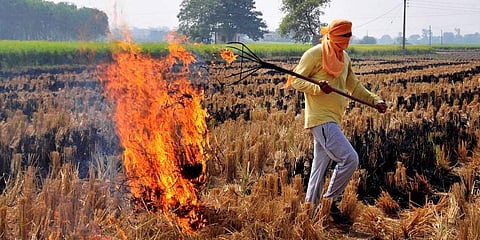

NEW DELHI: The incidents of stubble burning from Punjab and Haryana have increased by 18% this year compared to previous year, leading to an increased share in PM 2.5 levels in the capital which is reeling under a severe pollution crisis.
According to the Indian Agriculture Research Institute, both states reported 3,800 fire incidents on Wednesday, which is the highest the season recorded so far, of which, Punjab had the most share.
The central agricultural research body said Punjab recorded 3,634 farm fires while Haryana reported 166 fire incidents on Wednesday.
Farm fires incident in Punjab stood at 1,842 on Tuesday, 2,131 on Monday, 1,761 on Sunday, 1,898 on Saturday and 2,067 on Friday. The raging paddy straw burning led to an alarming spike in PM 2.5 pollution and contributed 32% to it, according to SAFAR, a forecasting agency under the Union Ministry of Earth Sciences.
The Central Pollution Control Board (CPCB) measured Delhi’s AQI on Wednesday in the upper end of ‘very poor’ category with a reading of 376. The AQI has remained in the “very poor” category days after Diwali, majorly due to unfavourable meteorological conditions including paddy straw burning in adjoining states.
Farm fires accounted for 14 per cent of the PM2.5 pollution in the national capital on Tuesday, 22 per cent on Monday, 26 per cent on Sunday and 21 per cent on Saturday. Last year, the share of farm fires in Delhi’s PM 2.5 pollution peaked to 48 per cent on November 7.
The experts suggest that the raging incidents indicate the peak of stubble burning and relief from it is expected only after November 15. “Farm fires are among the many factors which affect the air quality of Delhi NCR. Its peak is expected around November 7 and a decline is expected from November 15 based on the trends of last one decade observed,” said Dr Ravindra Khaiwal, professor of environmental studies, PGI Chandigarh.